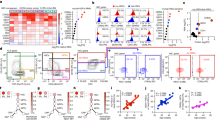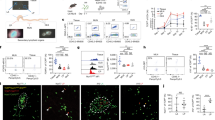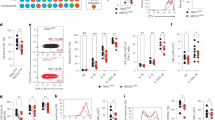Abstract
Maturation of dendritic cells (DCs) initiates adaptive immune responses and thereby provokes allograft rejection. Here, this study aimed to explore the effect of Methyltransferase-like protein 3 (METTL3) silencing on DC function and the role of METTL3-silencing donor DCs in the immune response after mouse heart transplantation. Bone marrow-derived DCs from donor BALB/c mice were infected with lentiviruses expressing METTL3-specific short hairpin RNA (LV-METTL3 shRNA) to silence METTL3. Then METTL3-silencing DCs were treated with lipopolysaccharide (LPS) for another 48 h to induce DC maturation. Recipient C57BL/6 mice were injected with phosphate-buffered saline (PBS), immature DCs, and METTL3 shRNA-DCs prior to the cardiac transplantation involving the transfer of hearts from donor BALB/c mice to recipient C57BL/6 mice. In vitro we demonstrated that METTL3-silencing DCs had lower expression of MHCII, costimulatory molecules (CD80, CD86), and DC-related cytokines (IFN-γ, IL-12) as well as lower ability to activate T-cell proliferation, which were consistent with the characteristics of tolerogenic DCs. In vivo we found that METTL3-silencing donor DCs induced immune tolerance after mouse heart transplantation and prolonged the allograft survival, which might be associated with Th1/Th2 immune deviation. In summary, METTL3-silencing DCs exhibit immature properties and prolong allograft survival.
This is a preview of subscription content, access via your institution
Access options
Subscribe to this journal
Receive 6 digital issues and online access to articles
$119.00 per year
only $19.83 per issue
Buy this article
- Purchase on Springer Link
- Instant access to full article PDF
Prices may be subject to local taxes which are calculated during checkout





Similar content being viewed by others
References
Grossi PA. Liver transplantation from donors with positive blood cultures: increased risk of graft failure or opportunity to expand the donor pool? Transpl Int. 2017;30:556–7.
da Silva MB, da Cunha FF, Terra FF, Camara NOS. Old game, new players: Linking classical theories to new trends in transplant immunology. World J Transplant. 2017;7:1–25.
Li H, Shi B. Tolerogenic dendritic cells and their applications in transplantation. Cell Mol Immunol. 2015;12:24–30.
Zhang M, Tang H, Guo Z, An H, Zhu X, Song W, et al. Splenic stroma drives mature dendritic cells to differentiate into regulatory dendritic cells. Nat Immunol. 2004;5:1124–33.
Banchereau J, Briere F, Caux C, Davoust J, Lebecque S, Liu YJ, et al. Immunobiology of dendritic cells. Annu Rev Immunol. 2000;18:767–811.
Mihret A, Mamo G, Tafesse M, Hailu A, Parida S. Dendritic cells activate and mature after infection with Mycobacterium tuberculosis. BMC Res Notes. 2011;4:247.
Wang X, Feng J, Xue Y, Guan Z, Zhang D, Liu Z, et al. Structural basis of N(6)-adenosine methylation by the METTL3-METTL14 complex. Nature. 2016;534:575–8.
Sledz P, Jinek M. Structural insights into the molecular mechanism of the m(6)A writer complex. Elife. 2016;5:e18434
Dai D, Wang H, Zhu L, Jin H, Wang X. N6-methyladenosine links RNA metabolism to cancer progression. Cell Death Dis. 2018;9:124.
Ianniello Z, Fatica A. N6-methyladenosine role in acute myeloid leukaemia. Int J Mol Sci. 2018;19:2345
Wang H, Hu X, Huang M, Liu J, Gu Y, Ma L, et al. Mettl3-mediated mRNA m(6)A methylation promotes dendritic cell activation. Nat Commun. 2019;10:1898–1898.
Ochando J, Ordikhani F, Jordan S, Boros P, Thomson AW. Tolerogenic dendritic cells in organ transplantation. Transpl Int. 2019;33:113–27.
Zhuang Q, Lakkis FG. Dendritic cells and innate immunity in kidney transplantation. Kidney Int. 2015;87:712–8.
Raker VK, Domogalla MP, Steinbrink K. Tolerogenic dendritic cells for regulatory T cell induction in man. Front Immunol. 2015;6:569–569.
Hill M, Cuturi MC. Negative vaccination by tolerogenic dendritic cells in organ transplantation. Curr Opin Organ Transpl. 2010;15:738–43.
Tomic S, Janjetovic K, Mihajlovic D, Milenkovic M, Kravic-Stevovic T, Markovic Z, et al. Graphene quantum dots suppress proinflammatory T cell responses via autophagy-dependent induction of tolerogenic dendritic cells. Biomaterials. 2017;146:13–28.
Zhang X, Beduhn M, Zheng X, Lian D, Chen D, Li R, et al. Induction of alloimmune tolerance in heart transplantation through gene silencing of TLR adaptors. Am J Transpl. 2012;12:2675–88.
Li B, Tian L, Diao Y, Li X, Zhao L, Wang X. Exogenous IL-10 induces corneal transplantation immune tolerance by a mechanism associated with the altered Th1/Th2 cytokine ratio and the increased expression of TGF-beta. Mol Med Rep. 2014;9:2245–50.
Wang H, Zhang X, Zheng X, Lan Z, Shi J, Jiang J, et al. Prevention of allograft rejection in heart transplantation through concurrent gene silencing of TLR and Kinase signaling pathways. Sci Rep. 2016;6:33869.
Author information
Authors and Affiliations
Corresponding author
Ethics declarations
Conflict of interest
The authors declare that they have no conflict of interest.
Additional information
Publisher’s note Springer Nature remains neutral with regard to jurisdictional claims in published maps and institutional affiliations.
Rights and permissions
About this article
Cite this article
Wu, H., Xu, Z., Wang, Z. et al. Dendritic cells with METTL3 gene knockdown exhibit immature properties and prolong allograft survival. Genes Immun 21, 193–202 (2020). https://doi.org/10.1038/s41435-020-0099-3
Received:
Revised:
Accepted:
Published:
Issue Date:
DOI: https://doi.org/10.1038/s41435-020-0099-3
This article is cited by
-
Epigenetic regulation in the tumor microenvironment: molecular mechanisms and therapeutic targets
Signal Transduction and Targeted Therapy (2023)
-
Targeting the RNA m6A modification for cancer immunotherapy
Molecular Cancer (2022)



